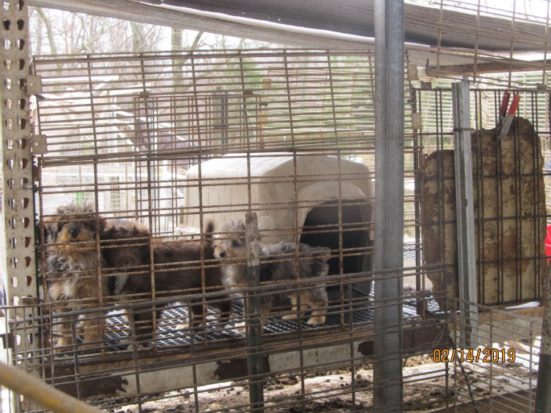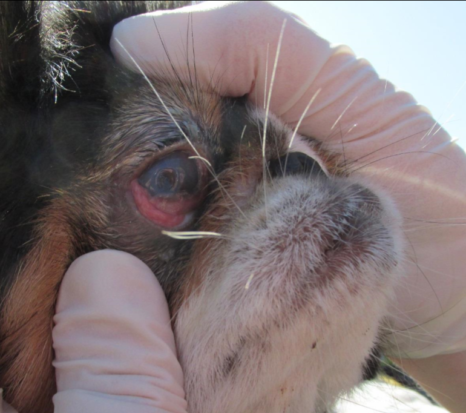
Above, dogs at a breeding operation, Cedar Ridge Australians, that appeared in the HSUS’s 2018 and 2019 Horrible Hundred reports. State inspectors have, again and again, found underweight or injured dogs at the operation in the latter half of 2018 and in early 2019, including a dog with bite wounds. Photo by the Missouri Department of Agriculture
Our seventh annual Horrible Hundred report, reveals shocking instances of neglect and mistreatment of dogs in puppy mills, including severely underweight dogs and large numbers of puppies dying mysteriously. What it also reveals is that the U.S. Department of Agriculture is failing – miserably – in its job of cracking down on the dog breeders and brokers who are responsible for numerous animal deaths and suffering.
Our Puppy Mills Campaign researchers, who combed through USDA and state inspection records for a year to create the report, found that even after state inspectors had cited breeders and brokers who sell to pet stores and online for serious violations, USDA inspectors sometimes failed to do so. For example, at Puppy Love Kennel, aka Cory’s Cuties in Elkland, Missouri, state inspectors found numerous problems in 2018 and 2019, including four dogs who had “died suddenly,” dogs with no water and some noticeably underweight dogs. But the USDA gave the facility a clean inspection report. At Tiffanie’s LLC, a massive dog broker that sells hundreds of puppies to Petland and other pet stores across the country, Missouri Department of Agriculture inspectors found 35 puppies had died within a six-month period, and dogs on the property had issues, including diarrhea, lethargy and skin disorders. But USDA inspectors who subsequently visited the site failed to document a single violation.
Increasingly, it seems, the USDA has assumed the position of adversary rather than an ally in the fight against puppy mills. For the last two years, we’ve published the Horrible Hundred report despite unprecedented challenges created after the agency, in 2017, redacted breeder names, kennel names and license numbers from most of the public inspection records available online. Our intrepid researchers have continued bringing out the report by using state inspection records to identify many of the problem dealers and breeders so you, the consumers, can have the information that the USDA has unlawfully withheld. Unfortunately, we were unable to identify several of the dealers, making it difficult to track the USDA’s oversight of those dealers over time.

A dog at a breeding operation that appears in our 2019 Horrible Hundred report. The breeder, Marilyn Shepherd/Williams, has been found with violations for seven years in a row, related to sick, underweight or injured dogs.
Last year, the USDA announced its intention to start pursuing small, cash-strapped rescues that transport pets for shelters. Meanwhile, it appeared to ignore problems at massive dog breeding operations we identified in our prior reports, including Craig Gray’s Georgia Puppies, which state authorities finally closed down in February after finding more than 700 dogs in shockingly poor conditions. Georgia Puppies had been selling puppies online with only a state license and with no apparent USDA license, which we revealed in last year’s Horrible Hundred report. But the USDA did not crack down on Georgia Puppies, or even require them to get a license.
Among our other interesting findings in this year’s report, for the seventh year running, Missouri had the largest number of problem puppy mills – 22. Iowa was second with 13, Pennsylvania had 12, Ohio had eight and Wisconsin and New York had seven problem puppy mills on the list.
Also, more than a dozen breeders in the report claim an affiliation with the American Kennel Club, a group that has routinely fought state laws designed to curb puppy mills. At a kennel in Missouri affiliated with the AKC, state inspectors found 10 underweight dogs. Another AKC-affiliated kennel in Nebraska was found “routinely noncompliant” by state inspectors for issues such as “piles of feces” and a limping dog. An AKC-affiliated German Shepherd breeder in Pennsylvania had a history of veterinary issues and repeat violations stretching back almost a decade.
The Horrible Hundred report is just one of the tools — albeit an important one — that we deploy each year to raise awareness about the dangers of puppy mills. We are also fighting for legislation, both at the state and federal level, to stop these entities who mistreat animals for their own profit. Last year, thanks to the work of the HSUS and our allies, Ohio passed one of the strongest laws in the nation to crack down on puppy mills. Bipartisan lawmakers in Congress have also introduced the Puppy Protection Act to strengthen baseline standards for puppy mills. And a proposed USDA rule would prevent breeders with uncorrected violations, or those who have had their licenses revoked, from obtaining a new license. If finalized and properly enforced, the rule could also require dog breeders to obtain individual annual veterinary examinations for each dog, as well as regular vaccinations against deadly diseases, and continual access to water.
We will continue to fight for the day when puppy mills are wiped out forever and we no longer have to publish a Horrible Hundred report. As a consumer, you can do your part by not buying puppies from pet stores or online, or from any breeder who won’t meet you in person and show you the conditions in which a puppy was raised. But for puppy mills to truly disappear, we need our government to do its job of swiftly citing and taking action against operations with miserable conditions, where animals who are ill or injured suffer needlessly. Please comment on the USDA rule, either through our form letter until the 17th, or directly on the Federal Register until May 21. Let the USDA know you support this rule and that you want to see even stronger and much more diligent enforcement of the Animal Welfare Act at commercial dog breeding facilities.
The post Annual Horrible Hundred report identifies problem puppy mills in U.S.; Reveals USDA is failing to crack down on violators appeared first on A Humane World.
Enviroshop is maintained by dedicated NetSys Interactive Inc. owners & employees who generously contribute their time to maintenance & editing, web design, custom programming, & website hosting for Enviroshop.
